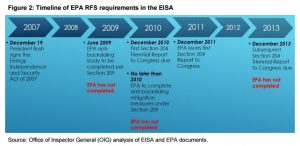Back in 2005, the Renewable Fuel Standard and its corn ethanol mandate were sold to the American public on three key themes: rising gasoline use, foreign oil dependency, and environmental stewardship. Improved engine efficiencies and the domestic oil from hydraulic fracturing rendered the first two reasons obsolete, and there is a strong consensus among green groups and scientists that the environmental benefits of ethanol are – at best – overstated. Indeed, a new report shows that biofuels production has actually resulted in a net increase of CO2 emissions.
However, EPA does not know for sure, because it has repeatedly failed to take the necessary – and statutorily required – steps to determine whether the much-touted environmental benefits of the RFS actually exist at all. A recent report from EPA’s Office of Inspector General states that although the agency is obliged to file a report on the RFS’ environmental impact every three years, it hasn’t filed one since 2011.  Even more concerning is their ability to carry out these tests at all. According to the report, EPA does not have a formal process to update its data on the RFS and air quality. EPA has stated it will have a report ready by the end of 2024, although given the fact that the agency has repeatedly missed deadlines associated with the RFS, we remain unsure they will hit this target.
Even more concerning is their ability to carry out these tests at all. According to the report, EPA does not have a formal process to update its data on the RFS and air quality. EPA has stated it will have a report ready by the end of 2024, although given the fact that the agency has repeatedly missed deadlines associated with the RFS, we remain unsure they will hit this target.
Unfortunately, despite mounting evidence that the RFS is broken and potentially working contrary to its intended purposes, the obligated parties and consumers are still paying dearly. As time passes, they are still subject to escalating costs associated with the RFS, as well as a broken RIN market subject to fraud. Evidence continues to mount that the RFS is unworkable and Congress needs to take immediate action.


